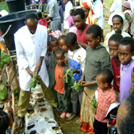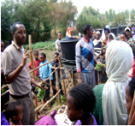Addis Ababa, Ethiopia
Goshu Worku (Ethiopia) and James Yasona (South Sudan) are working on an urban agriculture project with 270 children from five schools and 150 women in Ethiopia. These community members are suffering from annual food shortages caused by a lack of adequate and safe irrigation water and a low awareness of urban agricultural techniques—combined with climate change related unpredictable onset and offset of the rainy season—and drought. A large percentage of these community members are living with HIV/AIDS (especially OVCs (orphans and vulnerable children) and women).
| Woman Voting During Needs Assessment Process |
|
 |
Goshu and James are developing a project that includes: |
Water Use Management Plan [Solution to underlying causes: Lack of adequate and safe water supply for irrigation.]
[Activity 1]. Community-based workshop and survey with community members to identify their knowledge of water use.
[Activity 2]. Consultation with water management expert to develop a participatory process and training program
[Activity 3]. Facilitate the Organization of a community based Water Use Management Committee
[Activity 4]. Community workshop on participatory mapping of water resources and uses (consciousness raising)
[Activity 5]. Prioritize water springs, rivulets, ravines and man-made waterways for protection/restoration
[Activity 6]. Committee participatory workshop on developing a community based Water Use Management Plan
[Activity 7]. Investigate and develop water sourcing alternatives for the community
[Activity 8]: Investigate and develop an installation and maintenance program
[Activity 9]: Data collection to identify scientific baseline data and facilitate the organization of a community based M&E Committee
| Urban Agriculture Workshop with Women and Children |
|
 |
Some of the background challenges this project faces are that people living with HIV are marginalized, frequently weak and are likely to be destitute. They aren’t able to earn enough income to provide sufficient food for their families. Without school fees — and with the need to help provide family income—many children drop out of school. Without skills and education, they will remain in the cycle of poverty. |
Climate Smart Agricultural Practices Programme [Solution to underlying causes: Unpredictable onset and offset of the rainy season and unusual dry periods.]:
[Activity 1]: Identify expert specialist/extension agent in soil, water and agriculture to design and facilitate participatory workshops
[Activity 2]. Participatory mapping and identification of local crop and buffering challenges
[Activity 3]. Farmer workshop and follow-up on early maturing and/or drought resistant crops/varieties for adapting to climate variability
[Activity 4]. Farmer workshop and follow-up on buffering against the late arrival of rain and/or an early end to the rainy season
Goshu’s organization has decided to develop this project as continuation of their urban gardening program—with an increased focus on food security, health, hygiene and nutrition in order to tackle the overarching challenge of low income and poor livelihood for people who are affected and infected by HIV/AIDS.
But to fulfill these project programs—they need water—water for irrigation of their urban gardens, and safe water to prevent illness due to waterborne disease. People living with HIV are particularly susceptible to infection. Clean water and nutritious meals can give them the health and strength they need to increase income generation. Urban gardens can give them something to sell.
James and Goshu have done their research. Researchers have shown that proper use and management of water for irrigation improved vegetable production nearly 100%—and the application of water through drip irrigation increases performance by 90%—allowing gardeners produce more vegetables. James and Goshu are also investigating properly filtered household gray water which will not only provide water for the gardens but reduce fees paid for water.
Download his report and needs assessment:
Needs assessment workshop
Initial project outline
Would you like to learn how to develop Community Based Adaptation Projects?
Please write us with your stories, thoughts and comments through Online.Learning@csd-i.org
